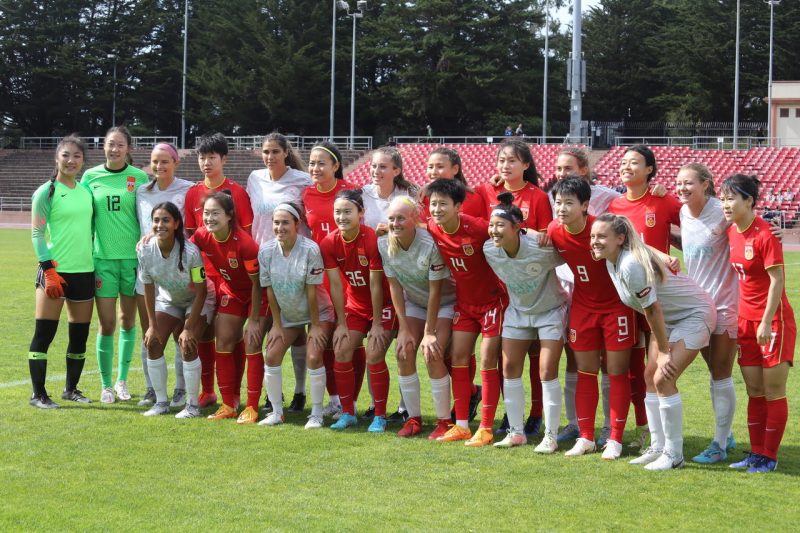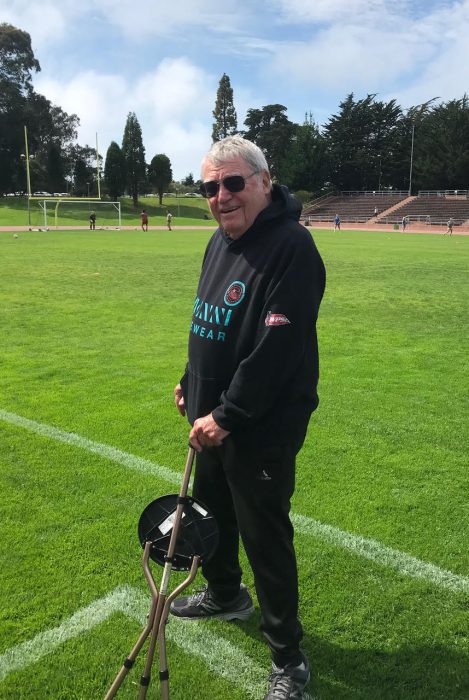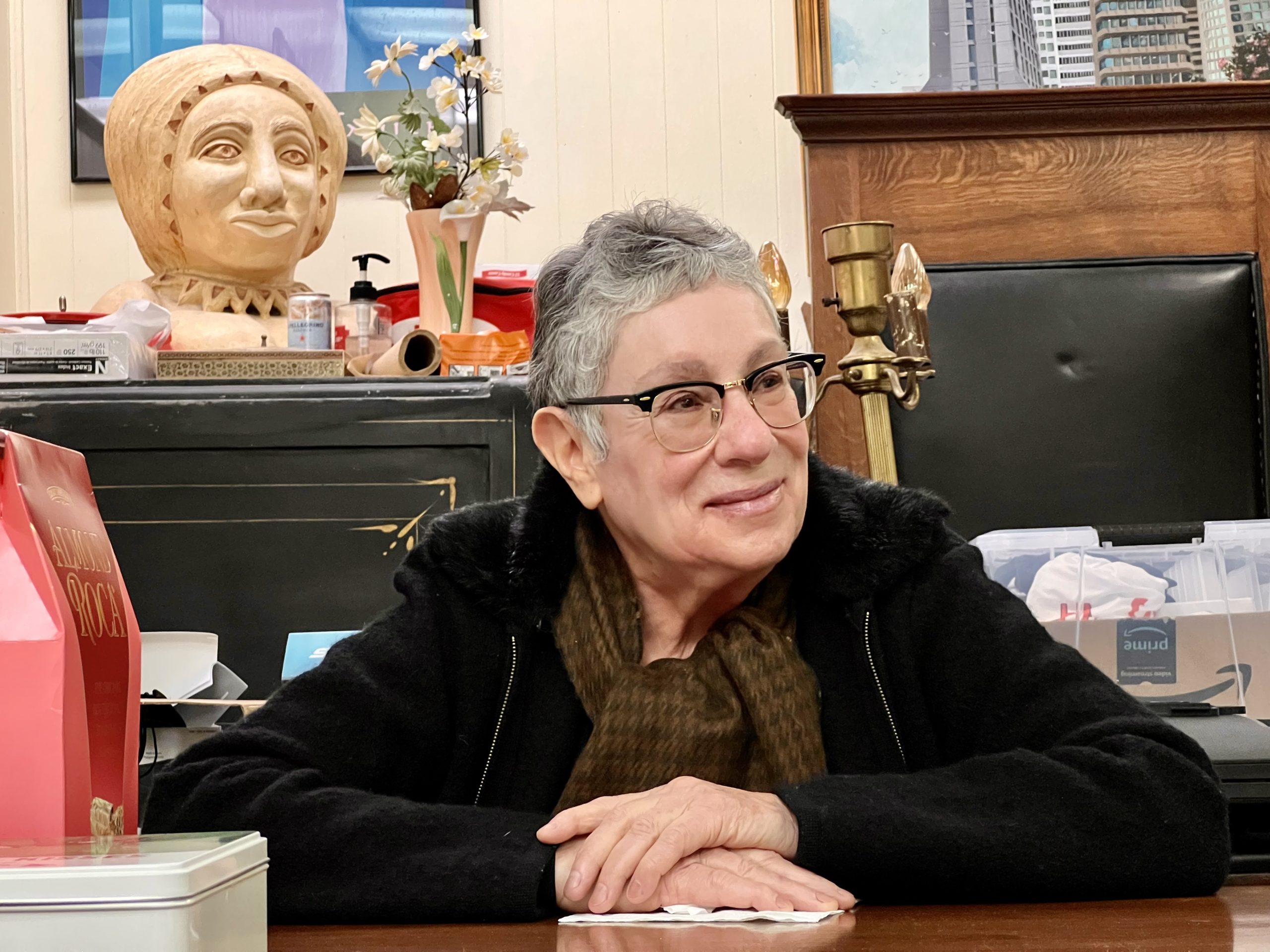His daughter wanted to play soccer, so he started an all-girls team; last month, they took on the Chinese women’s national team.
Two women’s soccer teams face off at Kezar Stadium. One is local, the other a world-class opponent. With the game tied 1-1, the SF Nighthawks‘ forward head-butts the ball, sending it off at a 90-degree angle. Her teammate corrals the pass and aims a swift kick toward the goal.
It misses, but a cheer resounds as spectators lean forward in their seats. The Bay Area women didn’t win, but they held their own against the Chinese Women’s National Team.
The July game was the highlight of the Nighthawks’ summer season, said team owner Richard Cross. “Though we lost 6-2, it was an honor to play the first U.S. game with the top-ranking Asian women’s team. We didn’t expect to win but we played a good game. It was the Chinese national women’s team after all.”

Head plays, kicks, passes – Cross has seen thousands of them over the decades he’s owned and coached the SF Nighthawks, the women’s soccer team he founded in 1995. Since then, over 600 girls and young women have worn the Nighthawks jersey and many have gone on to play on college teams or become coaches, and a few have turned professional.
No games for girls
Cross didn’t set out to manage a soccer team. He was simply looking for a sport that would be suitable for his son and daughter when they were in grade school. Soccer, he said, seemed appropriate. But Cross discovered that when it came to soccer, there were far more opportunities for boys than for girls.

There was no dearth of school and clubs, teams not affiliated with schools, in the mid-’80s, ready to welcome young men. But that was not the case when his daughter, Amber, was ready to play five years later. Cross managed to find her a mixed team, and he began coaching.
By the time she turned 12, she was hooked on the game. More girls were eager to play, and teams and leagues for women began to form. Her dad was among the leaders of that effort. Initially, he coached Amber’s school team, but what to do over the summer and after graduation and girls still want to play soccer?
In 1995, Cross started the SF Nighthawks, which has year-round play. “I wanted to give young women an opportunity to elevate their play, to improve.” For that, they needed experienced coaches and continuing practice. Amber was one of the first players.

Weather and rules regulating who can play determine the competitive season. Players on school teams can only play for a club team when school is not in session. That leaves six to eight weeks of highly competitive play during the summer when most games are played at Kezar or on the soccer field south of the Beach Chalet.
But a good team needs good competitors, not just casual opponents. Three years after forming the Nighthawks, Cross and three other managers of California teams founded the Women’s Premier Soccer League. “We started with four teams; in no time we reached about 150,” Cross said.
Still active at 82
Others coach the team today, but Cross, still active at 82, remains the manager. He’s responsible for the financial side of the organization, meaning he must either provide the funds himself or find sponsors to pay the team’s expenses, including league dues, field rent, and money for uniforms, travel and equipment. Initially, he was the sole “deep pocket,” he said, but local businesses have since pitched in.
Cross was born in Denver, Colo. His first sports were basketball and tennis, which he played at the competitive level until an injury benched him two years ago. He played the saxophone, studied art and music at the University of Colorado but dropped out before graduation. Bored with Denver, he and two friends took off for the West Coast, only stopping when they came to Manhattan Beach. “It was a good life. We hung out with our friends, partied, played music and earned a little money,” he said.
When the beach bum lifestyle paled, Cross moved to the Bay Area, where he attended San Francisco State College (now University) and became an accountant, a career he plied until retirement.
Now that he’s retired, Cross has more time to indulge interests beyond soccer. But none can replace his commitment to the game, a passion shared by his daughter, who now plays in an “Over 35” league and coaches at Lowell High School, and his three grandchildren, who play on both school and club teams.
Friends have tried to get him back on the tennis court, but knee and back problems make it difficult for him to get around. Sometimes he needs a cane. Asked if he uses a cane on the soccer field, Cross answered, “not if I can help it.”
‘A more interesting game’
Cross has been an advocate for soccer since his children first kicked the ball – and he’s happy to say why: “Soccer is the best sport for young people. It’s inexpensive to enter and you don’t have to be big to play. It’s a dynamic, 90-minute game with a lot of action that requires quick thinking. There are no timeouts; the coach isn’t there to tell you what to do.”

The game with the Chinese women’s team brought out a thousand spectators, but most Nighthawk games only draw a handful of people, mostly players’ family members.
“Women’s games have fewer theatrics. Unlike men, women don’t fake injuries on the field. And because they don’t kick as well as men there are a lot of small passes up the field,” said Cross. “While Europeans are turning out in droves for women’s soccer — or as they call it, football — we haven’t caught up yet.
“It’s too bad we didn’t attract more spectators.” Women’s soccer has less drama perhaps, but “It makes for a prettier and more interesting game,” he said.






Inge Byrnes
Great reading about you after all these years at Vikings Soccer Club, Dick.